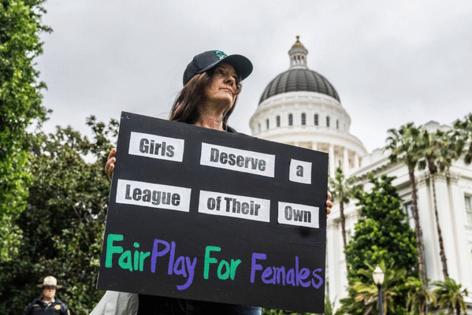California changes rules around trans athletes after Trump's threat to halt funding
Published in Political News
SACRAMENTO, Calif. — The state organization that oversees school sports in California will allow cisgender female athletes to compete in an upcoming statewide championship track meet if they lost a qualifying position to a transgender competitor, a change that was announced hours after President Donald Trump threatened to withhold federal funds if local officials didn’t block a trans girl from competing at the event.
The California Interscholastic Federation said it would launch a pilot program for the 2025 State Track and Field Championships, to be held Friday and Saturday in Clovis, allowing cisgender athletes to compete even if they did not initially qualify. CIF has not published or shared the full policy as of Tuesday afternoon.
“Under this pilot entry process, any biological female student-athlete who would have earned the next qualifying mark for one of their Section’s automatic qualifying entries in the CIF State meet, and did not achieve the CIF State at-large mark in the finals at their Section meet, was extended an opportunity to participate in the 2025 CIF State Track and Field Championships,” the organization said in a statement.
“The CIF believes this pilot entry process achieves the participation opportunities we seek to afford our student-athletes.”
It’s unclear how many people this policy will apply to; a CIF spokesperson did not immediately respond to a request for clarification. Trump singled out one trans athlete, who has been the subject of a right-wing harassment campaign, in his Monday morning Truth Social post. UCLA’s Williams Institute estimates there are 122,000 high school trans student-athletes nationwide.
Izzy Gardon, a spokesperson for Gov. Gavin Newsom, said the CIF had adopted the policy before Trump singled out the state in his post.
“CIF’s proposed pilot is a reasonable, respectful way to navigate a complex issue without compromising competitive fairness — a model worth pursuing,” Gardon said. “The governor is encouraged by this thoughtful approach.”
In 2013, under Gov. Jerry Brown, California became the first state to pass an anti-discrimination law guaranteeing transgender student-athletes the right to participate on sports teams that reflected their gender identity. The law has come under fire from anti-trans advocates, who have seized upon the issue of athletic participation as an electoral issue, to varying degrees of success.
At the state level, Republicans seized upon the policy change to gin up support for a past policy that would have banned trans girls from school sports. An assembly committee overwhelmingly rejected a related measure in March from Assemblymember Kate Sanchez, R-Rancho Santa Margarita.
“As a former athlete, this has been a top priority for me since day one,” Sanchez said in an X post. “We must resolve this issue as soon as possible.”
“At the last minute, Newsom is scrambling to rewrite the rules of high school sports, not to protect girls, but to save face after Trump called out CA’s radical and unfair policies,” said Senate Minority Leader Brian Jones, R-Santee. “This is just another political stunt to dodge embarrassment and avoid losing federal funding.”
The CIF policy is likely to push Newsom and Trump further into conflict, even as the governor has tried to balance cooperating with the president on some issues, like wildfire response, while promising to “stand tall and firm” when the White House targets California.
After endorsing CIF’s pilot program, Newsom was largely quiet Tuesday ahead of his planned appearance at the 2025 Bay Area-Silicon Valley Summit in San Francisco.
In his post, Trump said even his sometime political opponent agreed with him, referring to a podcast episode where Newsom sided with conservatives who said allowing trans athletes to compete with cis peers was “unfair.”
Nationally, Democrats have reeled from their 2024 election loss and a historic drop in voter favorability. Newsom, believed to be considering a run for president in 2028, has responded by going on podcasts and TV talk shows, which political experts view as a ploy to market himself to more moderate voters while rehabilitating what he called the Democratic Party’s “toxic brand.”
It’s unclear how successful that approach has been. Newsom initially declined to criticize Trump when he first took office after asking the federal government for $40 billion after a series of wildfires devastated the Los Angeles area, even as Trump blamed him for the infernos.
The governor has since ramped up some of his criticisms by blaming a projected $16 billion hole in the state general fund on lost revenue from Trump’s tariffs.
To date, neither Congress nor Trump has responded to California’s request for disaster relief aid reimbursement. Newsom said at a budget press conference earlier this month he had not spoken to the president in recent weeks.
_____
©2025 The Sacramento Bee. Visit sacbee.com. Distributed by Tribune Content Agency, LLC.

























































Comments